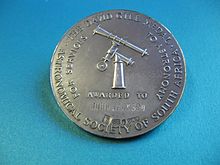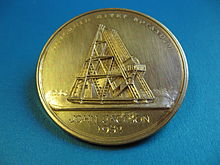208:
200:
105:, and, after taking the entrance exam, was awarded a major scholarship to study at Trinity College as an ordinary undergraduate in 1909. He already knew as much spherical and dynamic astronomy as was then taught at Cambridge, but was introduced to new subjects including solar physics and astrophysics, whilst also furthering his knowledge of pure and applied mathematics. During his time at Cambridge he was awarded further medals for his work in astronomy.
22:
183:. Jackson worked on this for a number of years, taking as many as 1000 photographic plates of the sky in a year from which to work from. Jackson obtained results for 1600 stars, published in three volumes of the Cape Annals. As a result of his work the knowledge of stellar parallaxes for the southern hemisphere became better known than that of the northern.
97:
Astronomy was studied under the tutelage of Ludwig Becker. Jackson gained a thorough grounding in the fundamental elements of the subject to the extent required for a complete understanding of astronomy. He learned how to use a variety of astronomical instruments, how to correct observations and how
77:
Graduating in 1907 with a first class honours Master of Arts degree in mathematics and natural philosophy, he was then awarded a fellowship of £100 a year for further study. The following year he undertook a
Bachelor of Science degree, again at Glasgow University, with special distinction in
190:
of the Sun. The
Greenwich observatory had planned to send an expedition to South Africa to observe the eclipse of 1 October 1940, but the outbreak of the Second World War made it impossible to send observers. Equipment was sent instead and Jackson took charge of an expedition from the Cape
136:
as a trigonometrical survey officer, plotting artillery trajectories. His experience of observing and his knowledge of spherical astronomy meant he was suitably qualified to carry out this work, even resorting to observations of the Sun to help determine ranges and positions.
121:. During a Zeppelin raid on London Jackson was in the observatory grounds studying the Moon. Urged to take shelter from the bombs by Dyson, Jackson is reported to have said 'the observatory was built to observe the Moon, and I am going to observe the Moon'.
471:
140:
Jackson returned from France in 1919 and resumed his duties at
Greenwich. The first extensive task he undertook was to prepare for publication all of the observations he had made of double stars, working on this with
98:
to apply mathematical and arithmetical analysis to solve astronomical problems. Becker's enthusiastic teaching methods must have had a profound influence on
Jackson as he then chose to pursue a career in astronomy.
73:
in spite of not studying the classics. During the summer of 1903 he studied hard to improve his knowledge of Latin, which saw him pass the university entrance exam sufficiently well to be awarded a £25 bursary.
234:
from 1953 to 1955. After retiring he did not leave his passion for astronomy behind, making a trip to
Stromatad in Sweden to observe the total eclipse of 30 June 1954. Many of Jackson's medals held at
66:, studying a range of subjects including the sciences and French and German, but not Latin or Greek, which were compulsory if he intended to sit the entrance examinations for university.
172:
of the sky above Cape Town, in order to derive the proper motions of these stars. He published these in two volumes, which covered the motions and spectral types of over 41,000 stars.
481:
226:
for his work on stellar parallaxes and his contributions to the general problems of star positions and proper motions. Further accolades awarded include the Gill Medal of the
223:
43:
461:
153:
revising the accepted notion of a 7-hour rotation to 19 hours with a possible error of 20 per cent, not too far from the true figure of 15.8 hours.
227:
476:
230:
in 1958 and he was made a CBE in 1950. He held the posts of
President of the Royal Society of South Africa in 1949 and was President of the
207:
162:
222:
He returned to
England, where he settled with his wife, Mary Beatrice Marshall, in Ewell, Surrey. In 1952 John Jackson was awarded The
323:
466:
114:
235:
231:
101:
As there seemed to be no possibility of obtaining an appointment in astronomy at
Glasgow, Jackson decided to go to
168:
Jackson's first task on arrival at the Cape was to work on the large collection of photographic plates taken by
266:"Address: Delivered by the President, Professor H. Dingle, on the Award of the Gold Medal to Dr John Jackson"
169:
63:
436:
55:
414:
199:
456:
451:
386:
180:
102:
245:
Ill health plagued his later years and on 9 December 1958 John
Jackson died after a brief illness.
142:
133:
132:, but in the spring of 1918, after the German armies breakthrough and advances, he was sent to the
356:
118:
83:
70:
69:
Having excelled at science, in particular chemistry, he decided to try for the entrance exam for
431:
319:
287:
146:
394:
348:
277:
265:
239:
176:
125:
33:
390:
21:
215:
Jackson retired from the Cape
Observatory in 1950, being replaced by his assistant Dr
445:
187:
129:
191:
Observatory to the observing site, where the total eclipse was successfully viewed.
313:
79:
238:, having been donated to the observatory by Paisley Grammar School. The crater
399:
374:
282:
216:
203:
Gill Medal awarded to John Jackson by the Astronomical Society of South Africa
36:
291:
91:
87:
352:
175:
Most of Jackson's time at the Cape was taken up with the determination of
186:
Throughout his career Jackson took part in four expeditions to observe a
59:
161:
In 1933 a vacancy arose for the position of His Majesty's Astronomer at
150:
360:
339:
Jones, Harold Spencer (1 February 1960). "John Jackson. 1887-1958".
211:
Gold Medal of the Royal Astronomical Society awarded to John Jackson
315:
Reflections on the Astronomy of Glasgow: A story of some 500 years
206:
198:
20:
149:. Jackson also worked on calculating the rotation of the planet
472:
Recipients of the Gold Medal of the Royal Astronomical Society
179:, a programme that had been started by his predecessor,
46:
for his work on stellar parallaxes and star positions.
117:
and Jackson was selected by the Astronomer Royal, Sir
432:
John Jackson page at Epsom and Ewell History website
341:
Biographical Memoirs of Fellows of the Royal Society
165:, South Africa. Jackson was appointed to the post.
113:In 1914 a vacancy as Chief Assistant arose at the
379:Monthly Notices of the Royal Astronomical Society
270:Monthly Notices of the Royal Astronomical Society
242:on the far side of the Moon is named after him.
124:In 1917 Jackson was granted a commission in the
54:Born on 11 February 1887 at Mossvale Street,
8:
482:Presidents of the Royal Astronomical Society
224:Gold Medal of the Royal Astronomical Society
94:, winning medals in most of these subjects.
44:Gold Medal of the Royal Astronomical Society
25:John Jackson (1887-1958), British astronomer
260:
258:
32:(11 February 1887 – 9 December 1958) was a
398:
281:
145:, the Savilian Professor of Astronomy at
254:
228:Astronomical Society of Southern Africa
375:"Obituary Notices : John Jackson"
7:
163:Royal Observatory, Cape of Good Hope
128:. He was sent to France to work on
14:
462:People from Paisley, Renfrewshire
62:, John Jackson was educated at
318:. Edinburgh University Press.
1:
415:"1995MNSSA..54...19C Page 20"
312:Clarke, David (30 May 2013).
477:Fellows of the Royal Society
115:Royal Observatory Greenwich
498:
236:Coats Observatory, Paisley
232:Royal Astronomical Society
50:Early life and education
400:10.1093/mnras/119.4.345
283:10.1093/mnras/112.3.345
353:10.1098/rsbm.1960.0009
212:
204:
64:Paisley Grammar School
26:
210:
202:
109:Greenwich Observatory
56:Paisley, Renfrewshire
24:
467:Scottish astronomers
276:(3): 345–357. 1952.
181:Harold Spencer Jones
103:Cambridge University
391:1959MNRAS.119..345.
143:Herbert Hall Turner
134:British Fourth Army
42:He was awarded The
16:Scottish astronomer
213:
205:
119:Frank Watson Dyson
84:natural philosophy
71:Glasgow University
27:
195:Awards and legacy
147:Oxford University
489:
419:
418:
411:
405:
404:
402:
371:
365:
364:
336:
330:
329:
309:
303:
302:
300:
298:
285:
262:
177:stellar parallax
157:Cape Observatory
497:
496:
492:
491:
490:
488:
487:
486:
442:
441:
428:
423:
422:
413:
412:
408:
373:
372:
368:
338:
337:
333:
326:
311:
310:
306:
296:
294:
264:
263:
256:
251:
197:
159:
126:Royal Engineers
111:
52:
17:
12:
11:
5:
495:
493:
485:
484:
479:
474:
469:
464:
459:
454:
444:
443:
440:
439:
437:Jackson Crater
434:
427:
426:External links
424:
421:
420:
406:
366:
331:
324:
304:
253:
252:
250:
247:
196:
193:
158:
155:
110:
107:
51:
48:
15:
13:
10:
9:
6:
4:
3:
2:
494:
483:
480:
478:
475:
473:
470:
468:
465:
463:
460:
458:
455:
453:
450:
449:
447:
438:
435:
433:
430:
429:
425:
416:
410:
407:
401:
396:
392:
388:
384:
380:
376:
370:
367:
362:
358:
354:
350:
346:
342:
335:
332:
327:
325:9780748678921
321:
317:
316:
308:
305:
293:
289:
284:
279:
275:
271:
267:
261:
259:
255:
248:
246:
243:
241:
237:
233:
229:
225:
220:
218:
209:
201:
194:
192:
189:
188:total eclipse
184:
182:
178:
173:
171:
166:
164:
156:
154:
152:
148:
144:
138:
135:
131:
130:sound ranging
127:
122:
120:
116:
108:
106:
104:
99:
95:
93:
89:
85:
81:
75:
72:
67:
65:
61:
57:
49:
47:
45:
40:
38:
35:
31:
23:
19:
409:
382:
378:
369:
344:
340:
334:
314:
307:
295:. Retrieved
273:
269:
244:
221:
214:
185:
174:
167:
160:
139:
123:
112:
100:
96:
76:
68:
53:
41:
30:John Jackson
29:
28:
18:
457:1958 deaths
452:1887 births
297:14 December
80:mathematics
446:Categories
347:: 95–106.
249:References
217:R. H. Stoy
170:David Gill
37:astronomer
292:0035-8711
92:chemistry
88:astronomy
60:Scotland
34:Scottish
387:Bibcode
385:: 345.
240:Jackson
151:Neptune
361:769280
359:
322:
290:
357:JSTOR
320:ISBN
299:2020
288:ISSN
90:and
395:doi
383:119
349:doi
278:doi
274:112
448::
393:.
381:.
377:.
355:.
343:.
286:.
272:.
268:.
257:^
219:.
86:,
82:,
58:,
39:.
417:.
403:.
397::
389::
363:.
351::
345:5
328:.
301:.
280::
Text is available under the Creative Commons Attribution-ShareAlike License. Additional terms may apply.


